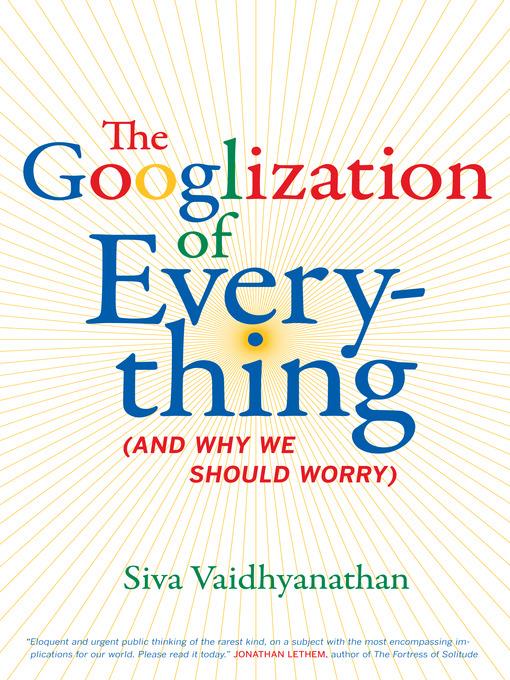
The Googlization of Everything
(And Why We Should Worry)
کتاب های مرتبط
- اطلاعات
- نقد و بررسی
- دیدگاه کاربران
نقد و بررسی

Starred review from January 24, 2011
What is the nature of the transaction between Google's computer algorithms and its millions of human users? Are we heading down a path toward a more enlightened age, or are we approaching a dystopia of social control and surveillance? With these and other questions, University of Virginia media studies and law professor Vaidhyanathan thoughtfully examines the insidious influence of Google on our society. In just over a decade, Google has moved so rapidly in its mission to "organize the world's information and make it universally accessible and useful" that cries of "Google it!" resound through high school classrooms, business offices, academic halls, and public libraries. As Vaidhyanathan points out, we must be cautious about embracing Google's mission and not accept uncritically that Google has our best interests in mind. He reminds us that Google is a publicly traded, revenue-driven firm that is dangerous in many subtle ways. By valuing popularity over accuracy and established sites over new ones, Google sets its own agenda regarding what information is most relevant to users, altering their perceptions about value and significance. Vaidhyanathan admirably concludes with a design for an information ecosystem called the Human Knowledge Project, which would be a more democratic means of parsing and organizing knowledge.

March 1, 2011
Information overload is the least of Google's problems in this intriguing exposé of the popular website.
Few readers need to be told that Google runs on advertising revenue rather than goodwill. But more interesting are the ways in which the so-called techno-fundamentalists have overestimated the layperson's ability to keep up with technological progress and the rest of the world's reluctance to accept its uncensored use. In this provocative book, Vaidhyanathan (Media Studies/Univ. of Virginia; The Anarchist in the Library: How the Clash Between Freedom and Control Is Hacking the Real World and Crashing the System, 2005) shows how Google's methods of capturing, storing and filtering information are often elitist and increasingly invasive. With confusing and oft-changing privacy policies—and the tendency to implement first, apologize later—Google has kept tech-savvy users on guard and the enraptured masses blissfully unaware of how, and with whom, their personal information is being shared. With good intentions but few enforceable boundaries, the author calls for a legal infrastructure that would keep the corporate giant in check. Vaidhyanathan focuses tightly on Google, only mentioning other privacy violators like Facebook in passing. Citing some of the company's most controversial headlines, from the toddler who was captured naked in his grandmother's garden with Google Street View to the settlement between Google and the Author's Guild over copyrights, the author unmasks the monster behind the friendly interface with the suspense of a horror novel.
An urgent reminder to look more closely at dangers that lurk in plain sight.
(COPYRIGHT (2011) KIRKUS REVIEWS/NIELSEN BUSINESS MEDIA, INC. ALL RIGHTS RESERVED.)

April 15, 2011
Vaidhyanathan (Copyrights and Copywrongs: The Rise of Intellectual Property and How It Threatens Creativity) delivers another act from his well-worn (and effective) town crier squawk box, this time focusing on Google and its monopoly role in our lives today. While a plethora of voices--Jaron Lanier, Jonathan Zittrain, Evgeny Morozov, to name a few--are screaming to be heard about all that is wrong with our web-technology-immersed world today, Vaidhyanathan is less pessimistic about the future. He has numerous concerns: infrastructural imperialism, corporations like Google filling the voids that were once the domain of public services, soft technical regulation and censorship of the web, privacy trade-offs to enable functionality, and the compromises we knowingly and unknowingly make in using Google's search services exclusively. VERDICT This book is in no way an attack on Google but more like a parent asking a child, "What do you want to do with your life?" then going through all the concerns one by one. Strongly recommended for anyone interested in the subject.--James A. Buczynski, Seneca Coll. of Applied Arts & Tech., Toronto
Copyright 2011 Library Journal, LLC Used with permission.

























دیدگاه کاربران